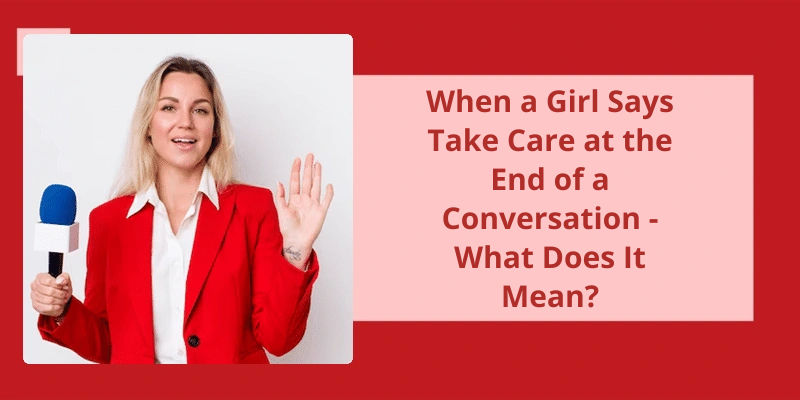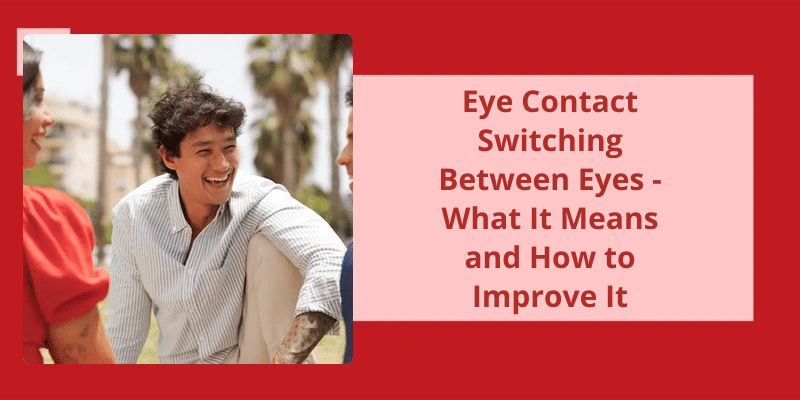However, in some situations, if a girl says “take care” with a more sincere tone or adds some extra words like “be safe” or “let me know how you’re doing,” it could indicate that she genuinely cares about you and your well-being. It’s important to pay attention to the context and how the phrase is delivered to understand it’s true meaning. Whether it’s a simple pleasantry or a sign of deeper feelings, responding with a genuine “thank you” or “you too” is always a good way to end a conversation. So, next time a girl says “take care,” take a moment to consider the meaning behind the words and respond accordingly.
When Someone Says Take Care Are They Saying Goodbye?
In social situations, “Take care” is generally used as a casual parting phrase between friends or acquaintances. It’s a way to express good will and concern for the other persons wellbeing. This is often accompanied with a hug or handshake, as a gesture of warmth and affection.
In this context, it’s a way of expressing business etiquette and a professional demeanor. It’s an appropriate way to end a meeting or conversation without appearing cold or dismissive.
If someone uses this phrase in a somber tone or with a concerned look on their face, it may indicate that they’re worried about the other persons safety or wellbeing. This could be in response to a recent illness, injury, or other difficult circumstance. In these situations, “Take care” may be more of a plea than a simple goodbye.
Additionally, “Take care” could also signal a desire to maintain contact with the other person. If someone says this after a first meeting or a chance encounter, it’s a subtle way of expressing interest in getting to know the other person better. It’s also a way of leaving the door open for future interactions or invitations.
It can be a friendly farewell, a professional sign-off, a gesture of concern, or an invitation for further connection. However it’s interpreted, the intention behind this phrase is to express goodwill and positivity towards the other person.
Different Ways of Saying Goodbye and Their Meanings
- Goodbye – a polite and formal way of bidding farewell.
- See you later – implies that the person will be seeing the other again in the future.
- Take care – a friendly reminder to be safe and well.
- Catch you later – similar to “See you later,” but more casual.
- Farewell – a more formal way of saying goodbye.
- Adios – Spanish for “goodbye.”
- Till we meet again – indicates that the separation is temporary.
- Peace out – very informal and casual way of saying goodbye.
- Later gator – a fun and playful way of saying goodbye, often used among friends.
Ending a message or letter with “take care” can be a great way to convey a sense of warmth and concern for the recipient’s well-being. While it’s not as formal as some other sign-offs, it’s still acceptable in many professional and personal situations. However, there are other options to consider depending on the context of your message. Let’s explore some alternatives to “take care” that you can use to bring your communication to a positive and thoughtful close.
Can I End a Message With Take Care?
In general, ending your message with take care is appropriate in a variety of professional and personal settings. It’s often used in emails or written correspondence, but can also be an appropriate way to end a phone call or face-to-face conversation. Take care is a friendly and sincere way to convey your well wishes to others.
However, it’s important to consider the context of your message and your relationship with the person you’re communicating with. If you’re writing to a new business contact or someone you haven’t met before, it may be more appropriate to use a more formal sign-off, such as sincerely or regards. On the other hand, if you’re writing to a close friend or family member, take care may be an ideal way to end your message.
When using take care, it’s important to remember that it’s a shortened version of the longer phrase take care of yourself. This implies that you’re encouraging the recipient to prioritize their own well-being and stay safe and healthy. It can also be meaningful to include a personalized message in your message, such as asking about their day or mentioning something specific to your relationship.
It’s always a good idea to research common sign-offs in the culture or community you’re communicating with to ensure that your message is well-received and respectful. Additionally, if you’re communicating in a professional setting, it may be necessary to follow company guidelines for appropriate sign-offs.
However, contextual factors are important to consider when choosing a sign-off, including your relationship with the recipient and the cultural norms of your communication setting.
Six Other Ways to End Your Message Besides “Take Care”
Here are six other ways to end your message besides “take care”:
1. Stay safe
2. Have a great day
3. Best regards
4. Sincerely
5. Warmly
6. Cheers
Source: How to End a Letter: 12 Useful Farewell Phrases – Scribendi
When we’re having a conversation with someone either in-person or through text, there comes a point where we need to wrap things up and say our goodbyes. Of course, different people have different ways of ending a conversation. One phrase that’s become quite common in recent times is “take care.” While it may seem harmless and polite on the surface, some people have wondered whether this phrase indicates that the person using it doesn’t want to text or talk anymore. In this article, we’ll explore this question in more depth.
Does Take Care End a Conversation?
I can assure you that “take care” is a commonly recognized phrase that’s often used as a polite way to end a conversation. While it doesn’t necessarily indicate that the person wants to stop texting altogether, it does suggest that they’ve nothing further to say or that they want to wrap up the discussion. In many cases, it can be interpreted as a sign of courtesy or goodwill towards the person they’re communicating with.
In some cases, it may simply be a formal way to say goodbye, while in other situations, it may be more indicative of the persons emotional state or their intentions. For example, if someone ends a conversation with “take care” after revealing that they’re going through a difficult time, it may suggest that they’re looking for support or empathy from the other person.
This can help to provide context and clues as to what the person really meant by their closing comment. Additionally, it’s always a good idea to ask for clarification if youre not sure what someone meant by their words – after all, communication is key to building strong and healthy relationships.
As with any form of communication, it’s always best to pay close attention to the words and actions of the other person in order to better understand their intentions and feelings. By doing so, you can foster stronger relationships and build more meaningful connections with those around you.
When someone bids you farewell with a “Take care”, it’s often a courteous gesture to reply back. However, responding with a “You too” may not always make sense depending on the situation. In this article, we’ll explore some alternative responses to consider when someone tells you to take care. Keep reading to find out more.
Is Take Care a Good Response?
When someone says “Take care” to you, it’s important to consider the context and tone in which it was said. In other cases, it may simply be a polite or habitual phrase used to conclude a conversation or interaction.
If you sense that the person genuinely cares about your well-being and wants you to take care of yourself, a simple “Thank you, I will” may be appropriate. On the other hand, if the phrase is used more casually or as a conventional way to say goodbye, a more casual or light-hearted response may be better.
Ultimately, the best response may depend on your personal relationship with the person who said “Take care” to you. If it’s someone you know well and have a close relationship with, you may feel more comfortable using a friendly or humorous response. If it’s someone you don’t know as well or someone who’s in a position of authority, a more formal or polite response may be more appropriate.
Regardless of the specific response you choose, it’s always important to acknowledge the persons well wishes in some way. Whether you simply say “Thanks” or offer a more detailed response, acknowledging the persons thoughtfulness and concern is key to maintaining positive relationships and interactions with others.
By paying attention to context and tone, and responding appropriately, you can ensure that you show the appropriate level of respect and gratitude while maintaining positive connections with those around you.
Conclusion
In some cases, it may be a way for the girl to show concern for the other person’s well-being, indicating that she wants them to be safe and healthy. In other instances, it may be a way for her to signal her own vulnerability or emotional state, expressing a need for support or understanding.






